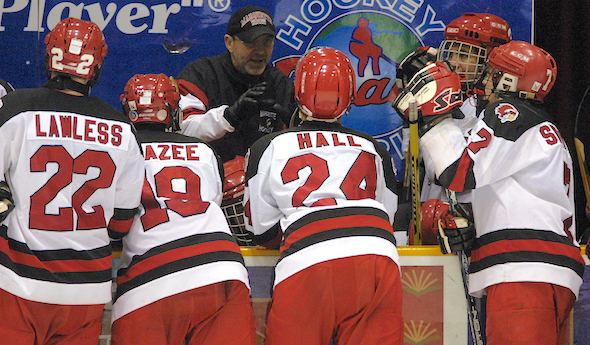
#TBT: 2002 Ends with Lights-Out Finals
July 12, 2019
By Rob Kaminski
MHSAA benchmarks editor
The Flint IMA had been to the MHSAA Ice Hockey Finals what Joe Louis Arena was to the Detroit Red Wings since it began hosting high school championships in the state in 1977.
For parts of four decades, the facility set the scene for many memorable moments on ice for scholastic skaters.
So it would have been fitting as the curtain was closing on an era March 9, 2002, if there’d been an overtime championship game or two to commemorate the last MHSAA Finals at the building.
In 2003, the MHSAA Semifinals and Finals would move to Compuware Arena in Plymouth – now USA Hockey Arena – where the event has been played ever since.
There would be no overtimes during the IMA’s swan song, but the arena wasn’t about to let go without a fight. Following the morning’s Division 2 Final, won by Grosse Pointe North over local qualifier Davison, things got strange.
As if by divine intervention, a significant power outage hit the Flint area between the first and second periods of the Division 3 Final, necessitating a return to the building for an encore performance that Monday.
Following is an account from then-MHSAA Assistant Director Randy Allen, administrator of the sport at that time.
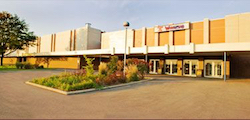 “East Grand Rapids and (Dearborn) Divine Child were between the first and second periods when the power went out at what must’ve been around three in the afternoon. Some of the house lights went on, but there was no huge generator. The power company told us it could be quite a while before the power came back, so the decision was made pretty quickly to come back Monday. (Editor’s Note: MHSAA regulations at that time prohibited Sunday competition, thus play would resume Monday)
“East Grand Rapids and (Dearborn) Divine Child were between the first and second periods when the power went out at what must’ve been around three in the afternoon. Some of the house lights went on, but there was no huge generator. The power company told us it could be quite a while before the power came back, so the decision was made pretty quickly to come back Monday. (Editor’s Note: MHSAA regulations at that time prohibited Sunday competition, thus play would resume Monday)
“Finishing the game in progress Monday was really a no-brainer, but now there were a couple of immediate challenges. First, how were we going to let people know, and second, what was going to happen to the (Detroit) Catholic Central-Marquette Division 1 game coming up later in the day?
“Well, knowing what I knew about the TV business (Allen’s background in Wisconsin included sportscasting), I grabbed one of the television reporters there, probably from Grand Rapids, and asked him to come down to the ice with me. It was totally dark; I figured once he put his camera lights on, it would get the attention of the crowd, which it did. So there’s about 2 or 3 thousand people in the arena – in the dark – and I’m standing in front of a light from a TV camera, and at the top of my voice I explain the situation and let them know we’re coming back Monday.
“Anyone wanting to come back, admission was free of charge, and we’d trust they were at the game. If they wanted a refund, they could mail their ticket stub to MHSAA and we'd send a refund. We obviously couldn’t use the box office without power. I don’t recall more than a couple dozen refund requests coming to our office later.
“Now the real challenge is the Division 1 game. Marquette very, very much wanted to go home and come back a week later. They’d been on the road all week (Marquette won a Quarterfinal in Traverse City that Wednesday). Jack (Roberts, former MHSAA executive director) was there, and he and Marquette’s AD (Scott Koski) and their superintendent debated a bit. In the end, the regulations of the day were upheld, and the game would be Monday.
“As it turned out, someone in the Marquette entourage had a contact in the Detroit Pistons front office, so the team was entertained in a suite at The Palace of Auburn Hills on Sunday night, so that was quite a happy ending from their standpoint.
“Many of the Marquette people were either in the arena or at a single hotel or two in the area, so alerting them to the change was not difficult.
“But then we started to think, ‘What about the Detroit CC people who would be driving up for their game later? Remember, social media was not as prevalent as it is today, or even the dependence on the internet.
“So, Saturday night, I sat there at the entrance to the IMA with my car running and lights on to inform the CC fans and anyone else who pulled up that the game had changed ... ‘Power’s out; game’s on Monday.’ They'd say thanks, and out they'd go. No one really got angry; there wasn’t anything anyone could do. I sat there an hour and a half with a steady stream, and shortly after the scheduled game time I called it a night.”
And, the IMA called it the end of an era, but not before hanging on for one more night, when Divine Child and Detroit CC would raise the last trophies in that building ... under the lights.
PHOTOS: (Top) Marquette was among teams that needed to stick around Flint two more days to play in the 2002 MHSAA Ice Hockey Finals. (Middle) Flint’s IMA arena.
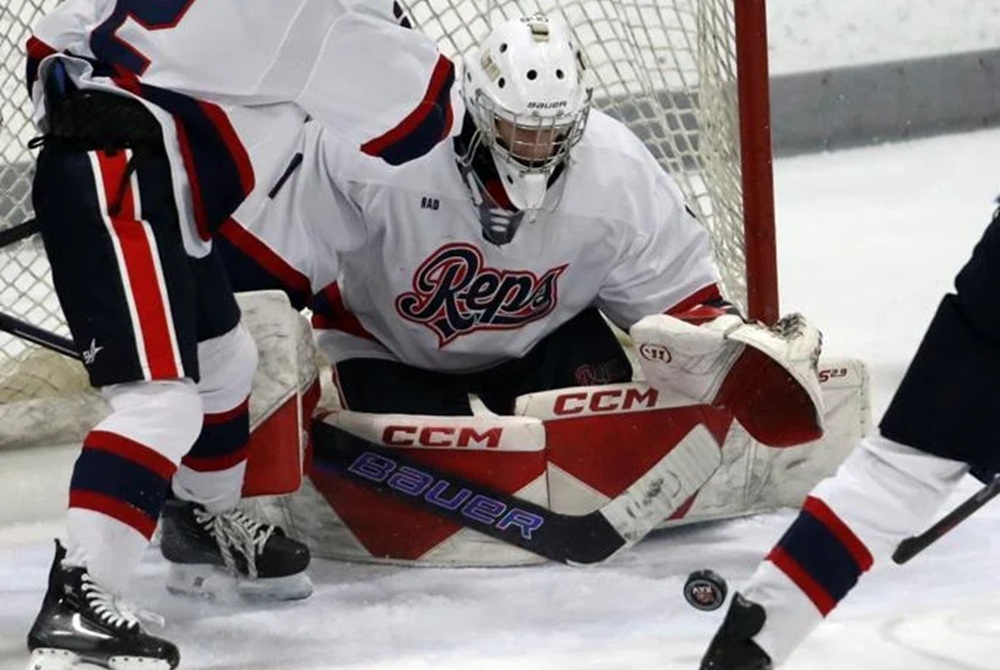
'TBF' Backstopping Bay Reps' Title Hopes as Exciting Future Takes Shape
By
Tom Spencer
Special for MHSAA.com
February 27, 2026
Tyler Boynton-Fischer knows his high school ice hockey career could end any day now.
 He also knows, or at least hopes, his playing days are far from over. Many, including his coaches, believe he’ll play at the next level and just maybe in the National Hockey League.
He also knows, or at least hopes, his playing days are far from over. Many, including his coaches, believe he’ll play at the next level and just maybe in the National Hockey League.
Boynton-Fisher is the record-setting goalie for the Bay Area Reps, a hockey co-op hosted by Traverse City St. Francis that includes athletes from Charlevoix, Elk Rapids, Kalkaska, Kingsley, Lake Leelanau St. Mary, Mancelona and Suttons Bay. He’s a senior at Traverse City St. Francis, and he finds himself in a familiar position.
The Reps are in the Quarterfinal for the second time over three years with Boynton-Fisher as their starting goalie. They advanced to the Regional Finals last season with Boynton-Fischer in net and his older brother Thomas, a senior then, and Grant Lucius leading an explosive attack.
Regardless of what happens when they take on Freeland on Saturday in Gaylord, the 6-foot-2 and growing goalie should play on. He’s been dreaming of playing in the NHL as far back as he can remember – and maybe longer.
“If I can, playing in the NHL would be really cool,” Fisher-Boynton said. “I am just excited to see what I can do and see what level I can play at.”
The dream could have begun as an infant when he was literally placed in the Stanley Cup as it visited Traverse City in 2008. From a photo, it almost looks like he was dreaming about making a kick save.
And while scientists continue to debate exactly when children start dreaming, Boynton-Fisher’s started in or before he was in first grade. His first-grade teacher, Kim Tumey, and his mother, Alysia Boynton-Fischer, recall having a follow-up discussion on a lesson at Willow Hill Elementary School in Traverse City.
Fisher-Boynton declared to his entire classroom he was going to play in the National Hockey League. Tumey, now retired, said the declaration was in response to how the students thought they could make money when they’re older. Tumey recalled further questioning Boynton-Fisher, and he said his mom would provide financially for him if he didn’t.
Boynton-Fisher is already making arrangements to play juniors – competitive amateur level for players aged 16–21 (but primarily 18–19) designed to develop skills for college and or professional hockey. His older brother Thomas went on to play for the juniors team in Saskatchewan after setting the Reps’ single-season assists record at 38 and finishing his high school career high on the Reps’ all-time career assists and scoring lists.
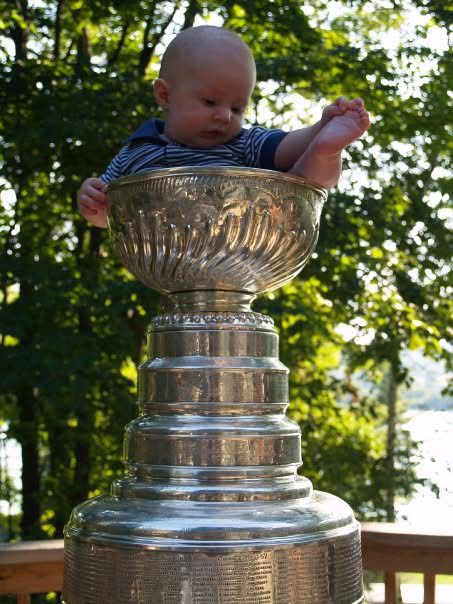 Their cousin, Dyson Drake, is playing juniors right now in the Manitoba Junior Hockey League. Drake is the son Dallas Drake, a member of the 2008 Stanley Cup-winning Detroit Red Wings. Fisher-Boynton often gets ice time with his uncle and cousin.
Their cousin, Dyson Drake, is playing juniors right now in the Manitoba Junior Hockey League. Drake is the son Dallas Drake, a member of the 2008 Stanley Cup-winning Detroit Red Wings. Fisher-Boynton often gets ice time with his uncle and cousin.
The former Red Wing was the first to hoist the cup on the ice, and he brought it to his Traverse City residence late that summer. He believes Boynton-Fischer has what it takes to play at the next level. The family and doctors believe the senior is still growing, giving him even more puck stopping capabilities.
“Tyler’s very athletic, and he's had a great high school career,” Dallas Drake said. “I know he wants to move on. I'm looking forward to see what he does.”
Drake is quick to point out Boynton-Fisher and his entire family has had to overcome challenges to get to today.
“We had a big loss in the family with his dad passing away,” Drake acknowledged. “He's gone through a lot in the last four or five years, and he's obviously adjusted very well, and he's a great kid. He works hard.”
Boynton-Fisher’s father Toby died unexpectedly before he started high school, causing him to step away from hockey briefly. He returned to the game with his brother knowing their father would want it that way.
“Everything was perfect – I was playing hockey, having so much fun. … We were in the summertime, and then he passed away,” Boynton-Fisher recalled. “It’s pretty traumatic when you realize you're not going to have a dad.”
Keeping the brothers playing hockey, and his sister Izzy in travel volleyball, has been a priority and a challenge for his mother.
“My number one goal after Toby passed away was to make sure that the trajectory of the kids’ sports wouldn’t change – Toby would hate that more than anything,” Alysia Fisher-Boynton said. “I could have never done that without all the help and love we received from all of our sports families.”
The loss led to Boynton-Fisher’s life motto.
“Through some rough things you can still have fun and live life to the fullest,” he explained. “(Dad) was a good guy, always was having fun joking around. If he wanted us to be happy, why would we just grieve him all the time when you can laugh instead of crying?”
Boynton-Fisher – who earned Division 3 all-state honorable mention last season – is known as “TBF” by many. He’s taken the nickname in honor of his father’s initials. Toby was the owner and operator of the Traverse City Golf Center. He also was known for his sense of humor.
Today, TBF’s coaches describe him as a pretty loose, easy-going kid loved by his teammates. They are quick to add he has prototypical goalie build features – long arms and legs – with incredible hand-eye coordination.
Competitiveness is his major strength, along with his demeanor and character. His coaches believe he’s the best Division 3 goalie in Michigan. Continuing the Reps’ run will bring Boynton-Fisher much deserved recognition, they say.
“His best quality is just his competitiveness, and he's very athletic too,” pointed out Reps coach Mike Matteucci, who also played in the NHL and was on the 1994 NCAA national champion Lake Superior State hockey team. “He loves the heat of the moment. He's just a very fiery, competitive person who wants to win.”
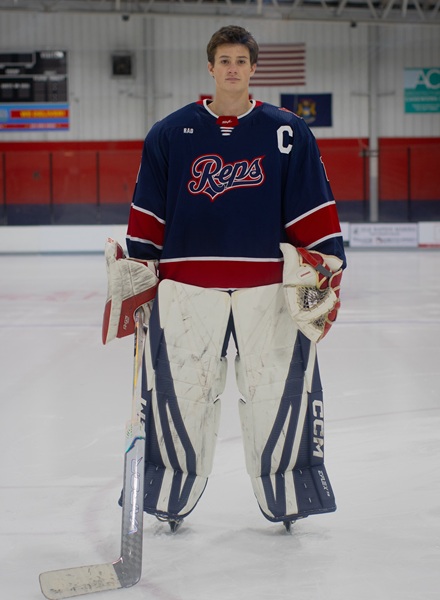 Matteucci grew up in the same area of British Columba as Drake and played against Drake as well. He too believes TBF can play professional hockey someday.
Matteucci grew up in the same area of British Columba as Drake and played against Drake as well. He too believes TBF can play professional hockey someday.
“It takes being in a situation where everybody's doing well and you get noticed,” he said. “He's durable, and I think he does have a good opportunity to continue to play with the attitude that he has and not getting too rattled in that spot.”
Fisher-Boynton leads Division 3 goalies in most stat categories. He’s top in goals-against average at 1.22, save percentage at .929, and shoutouts with six. He’s the Reps career shutout record-holder and the winningest goalie in the co-op’s history.
He’d like to add a Finals championship too.
TBF is a captain, rare for a goalie in Reps history. He owns the program record for most wins for a career, now at 38, the career shutout record of 12 and the single-season shutout records of five.
Really, the only program record he doesn’t own is for wins in a season. He had 16 his sophomore year, which is second all-time.
Boynton-Fischer and his older brother Thomas were both selected as Rookie of the Year by the Reps’ coaching staff after their respective first years in the program, and their names are stacked on the plaque.
Longtime assistant coach and former Reps head coach Ryan Fedorinchik recalls vividly the first time TBF was exposed to high school hockey. His new teammates, led by Thomas, gave him a quick orientation during a summertime skate.
They pretty much scored at will that day, but never again. It didn’t take long for Fedorinchik to believe the Reps had a top-notch goalie.
“I didn't know to what level Tyler's competitive nature was, and once the season started, it became immediately apparent that he was not only incredibly athletic, but extremely competitive,” Fedorinchik said. Fast forward to the end of the season and we go to the final four, and Tyler had a great year.”
Matteucci is hoping the Reps continue to improve with their record-setting goalie. Marquette, Houghton, Grosse Pointe Woods University Liggett, East Grand Rapids, Orchard Lake St. Mary’s and Dearborn Divine Child are the other Division 3 quarterfinalists.
“As a coaching staff we like to talk about improvement and putting us in a situation where at the end of the year we've improved, and we have a chance,” Matteucci asserted. “If we're playing like we can, we have an opportunity for sure.”
The Reps are 15-12-1 on the season, coming off a 3-1 win over Petoskey in the Regional Final. Colton Davidson, Thatcher Beaudoin and Madden Pateman all scored against Petoskey. Picking up two assists was Chase Kent, while Luke Schulte, Jake Ingersoll and Nolan Ziecina each had one helper.
Boynton-Fisher stopped 22 shots in the Regional Final.
 Tom Spencer is a longtime MHSAA-registered basketball and soccer official, and former softball and baseball official, and he also has coached in the northern Lower Peninsula area. He previously has written for the Saginaw News, Bay County Sports Page and Midland Daily News. He can be reached at [email protected] with story ideas for Manistee, Wexford, Missaukee, Roscommon, Ogemaw, Iosco, Alcona, Oscoda, Crawford, Kalkaska, Grand Traverse, Benzie, Leelanau, Antrim, Otsego, Montmorency, Alpena, Presque Isle, Cheboygan, Charlevoix and Emmet counties.
Tom Spencer is a longtime MHSAA-registered basketball and soccer official, and former softball and baseball official, and he also has coached in the northern Lower Peninsula area. He previously has written for the Saginaw News, Bay County Sports Page and Midland Daily News. He can be reached at [email protected] with story ideas for Manistee, Wexford, Missaukee, Roscommon, Ogemaw, Iosco, Alcona, Oscoda, Crawford, Kalkaska, Grand Traverse, Benzie, Leelanau, Antrim, Otsego, Montmorency, Alpena, Presque Isle, Cheboygan, Charlevoix and Emmet counties.
PHOTOS (Top) Traverse Bay Reps goalie Tyler Boynton-Fischer guards his team’s net during a game this season. (Middle) Boynton-Fischer “kick-saves” in the Stanley Cup in 2008. (Below) Boynton-Fischer stands tall for the Reps, who have advanced to a Saturday Quarterfinal. (Action shot courtesy of the Traverse City Record-Eagle. Other photos are courtesy of the Boynton-Fischer family.)

